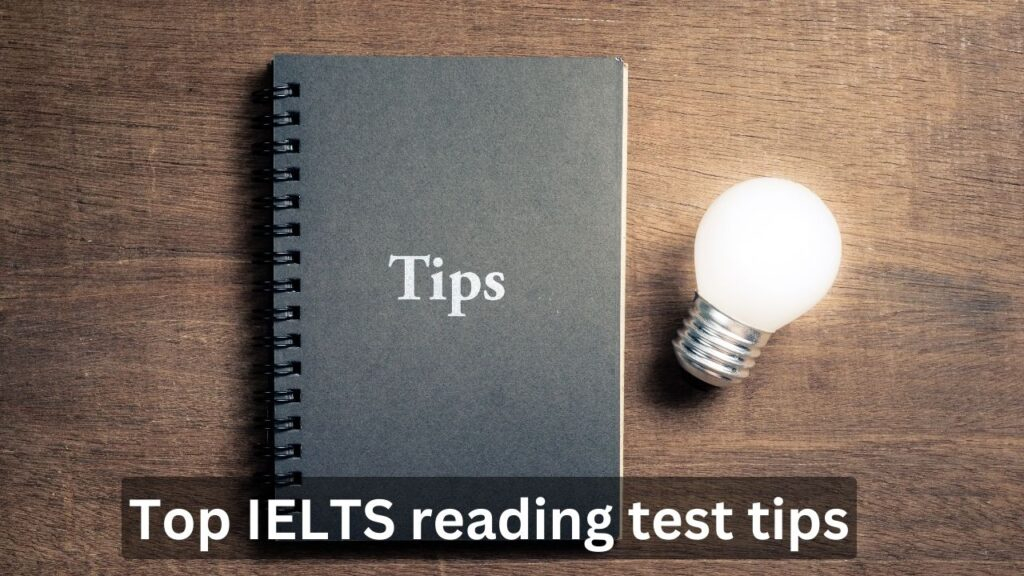Top tips and strategies for IELTS reading

Do you want to know about the reading part of IELTS? Among the four modules of IELTS, the biggest problem to face is the reading part. You will read three passages and answer 40 questions in 1 hour; it takes work. You have to prove to the test how much you can quickly extract the primary information from the passage. So, how do you do well on the reading test? In this article, we have provided some tips and strategies.
Two types of languages for IELTS reading
There are two types of languages for IELTS reading. One is the language of the question, and the second is the passage’s language. What is the difference between these two languages? The difference is they always use synonyms. The question and the passage always use synonyms. So, first, you need to identify those synonyms; second, you must know where questions and answers are in order and where they are not. This is how you can easily find your way out and find one clue word in the question. If you scan that word successfully in the passage, your life in IELTS reading will be easier.
Understanding the IELTS Reading test format
The IELTS reading part, while challenging, is manageable. It consists of 3 passages with a total of 40 questions. You have a generous 1 hour for the reading test, with each question carrying one mark. These questions usually come from books, magazines, newspapers, and journals. Below are the three passages of the reading section:
- Passage 1: This passage is relatively easy compared to other passages. This passage 1 contains 13 questions. The questions are under the individual sections.
- Passage 2: This passage is more complex than the first one. There will also be 13 questions.
- Passage 3: Passage 3 is the most difficult. So try to finish Passage 1 and Passage 2 quickly and give Passage 3 a little more time. Here, you see 14 questions. Several sections will include 14 questions. In this section, you will get the MCQ part.
The reading test format for IELTS general training and academics is the same.
Effective Techniques for IELTS Reading Success
The characteristics of the IELTS reading test in each section are different. So be careful while answering each question. Below is some discussion about the question:
- Multiple choice question
- MCQ may have four or more numerical options.
- Sometimes, an MCQ may have 2 to 3 or more correct answers.
- Marks are higher in MCQ and have multiple options.
- It means that if there are two or three answers in an MCQ, then there are two or three marks in that MCQ.
True, false, and not given
- Confirmed: If the answer matches what the writer said, then the answer will be accurate.
- False: If the answer does not match what the writer said, then the answer will be false.
- Not given: If the statement in question is such that it is impossible to say the writer, then the answer will not be given.
Sentence completion
- Find the keyword in the question so that it becomes easier to extract the answer from the passage.
- Try to locate the information near the question in the passage.
- After getting the information, before writing in the answer sheet, you must understand whether the answer’s grammar matches the question’s gap.
- If you find any location, year, date, or number in the passage, mark it.
Importance of time management in the IELTS Reading test

The IELTS reading test is a test of both speed and comprehension. The exam lasts 60 minutes, and 40 questions will be answered. Candidates should take less than 1 minute for each question. This underscores the importance of effective time management in ensuring a thorough understanding of the passages. You can give 20 minutes for each question. However, since the first passage is comparatively more straightforward than the other passages, give a little less time to the first passage and provide a little more time to the remaining two passages.
Some IELTS reading test tips

If we follow some tips we can do very well in reading. Below are some tips for reading:
Do you know all the word meanings?
- It is wrong to expect you to know every word’s meaning. When you do not understand the meaning of a word, try to understand the words around that word. By knowing the surrounding words, you can guess the unknown word to some extent.
- And if you can’t think of the word, then skip it.
- Always try to focus on the words related to the question.
To improve your reading skills:
- Practice reading more and more.
- Don’t just limit yourself to reading IELTS books; practice reading a lot daily. Read newspapers, magazines, reports, storybooks, and articles, and practice English daily.
Read Instructions:
- Read each instruction very carefully. Such as No More than two words, No More than three words, No More than two words, and the number. Keep an eye on these types of instructions.
- You will not get marks if you do not follow instructions.
Vocabulary:
You can follow three tricks in vocabulary
- Read
- note
- review
Time is most important: Keep time in mind while taking reading tests because each time is essential to your IELTS reading test.
- One mark for a question, so skip if a question is difficult to understand. Otherwise, you will be unable to answer many questions later due to lack of time.
- Negative marks do not matter in IELTS scores. So, if you are (40 – 50)% sure about any question, then you will attempt to answer it.
- It would help if you used a pencil while writing. First, write your answers to the questions with a pencil and then transfer them accurately to the answer sheet.
- The reading tests do not give extra time for transferring answers on the answer sheet. So attempt the exam within 1 hour to complete.
Improve your vocabulary for the IELTS Reading test
- Create a handmade vocabulary notebook where you can find new words with Bangla meanings every time.
- To increase your vocabulary, always read books, newspapers, magazines, etc.
- There is a lot of material on online platforms. If you have trouble pronouncing any word, you can use Google Translate.
- Try to watch English movies and TV series with subtitles. It helps with the IELTS reading and listening test.
- Writing skill habits help you to improve your IELTS exam. Write your whole day in a daily diary following the writer’s writing strategy, where you will write daily life descriptions.
- You are speaking English in front of the mirror, and trying to talk to communicate with other people in English can build confidence.
- Remember to use flashcards and vocabulary apps. These tools use repetition techniques.
Practicing with past IELTS Reading test papers
Reviewing past questions is very important for IELTS exam preparation. By looking at the past questions, you can understand the pattern of the previous years. It will benefit you if you can solve the questions of the past 7,8 years. You will get an idea about the IELTS reading test type of questions. Solving the questions on time will help you prepare better for the IELTS reading test day. Match the solve after answering each question. Try to understand the questions in which the answers are wrong. Solving this question will give you two benefits:
- You will learn some new words.
- You can answer faster than others on the day of the main exam.
